 Expert's opinion
Expert's opinion
Expert's opinion
The article is a subjective view on this topic written by writers specializing in medical writing.
It may reflect on a personal journey surrounding struggles with an illness or medical condition, involve product comparisons, diet considerations, or other health-related opinions.
Although the view is entirely that of the writer, it is based on academic experiences and scientific research they have conducted; it is fact-checked by a team of degreed medical experts, and validated by sources attached to the article.
The numbers in parenthesis (1,2,3) will take you to clickable links to related scientific papers.
Vegan Gluten Free Dessert Recipes You Can Try In 2024
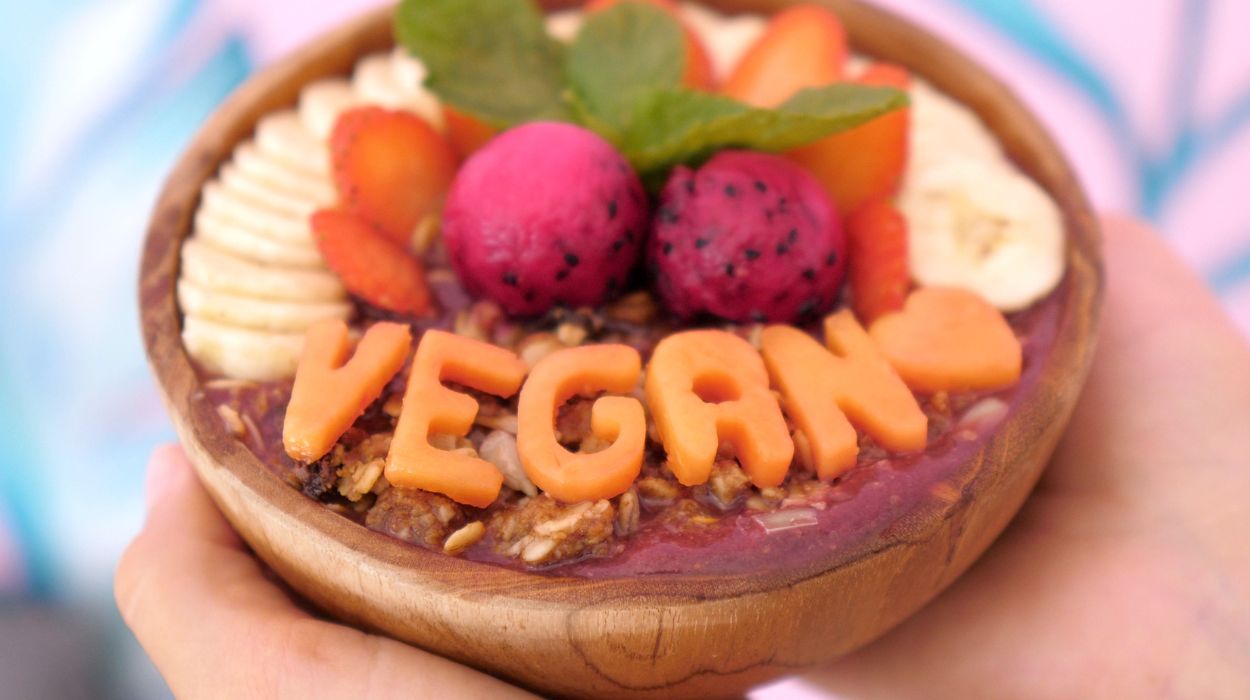
Adopting a vegan diet entails avoiding animal products like dairy, eggs, and honey, whereas living a gluten-free lifestyle entails avoiding wheat, barley, and other gluten-containing grains. At first, it could appear daunting to combine these dietary limitations, but don’t worry!
The advent of vegan and gluten-free diets in recent years is valued at 7 billion dollars[1] and has spurred a culinary revolution challenging conventional ideas of desserts. Creative bakers and cooks have been inspired by the need for gluten-free, plant-based sweets to create vegan, gluten-free dessert recipes that satisfy various dietary requirements using plant products like nuts and seeds.
Join us as we explore the benefits and versatility of plant-based ingredients, the art of substituting gluten-containing components, and the magical alchemy that transforms simple ingredients into delectable treats.
6 Vegan Gluten Free Desserts
- Raspberry Coconut Popsicles.
- Apple Cinnamon Crisps.
- Pumpkin Energy Balls.
- Quinoa Chocolate Chips Cookie.
- Coconut Mango Nice Cream.
- Mixed Berry Chia Pudding.
Vegan Gluten Free Dessert Recipes That Are Healthy And Delicious
Vegan, gluten-free desserts come in a wide variety of mouthwatering tastes and textures, from vegan protein bars to delicious berry tarts. Below are some vegan desserts that you can enjoy that cater to your gluten-free lifestyle:
Raspberry Coconut Popsicles
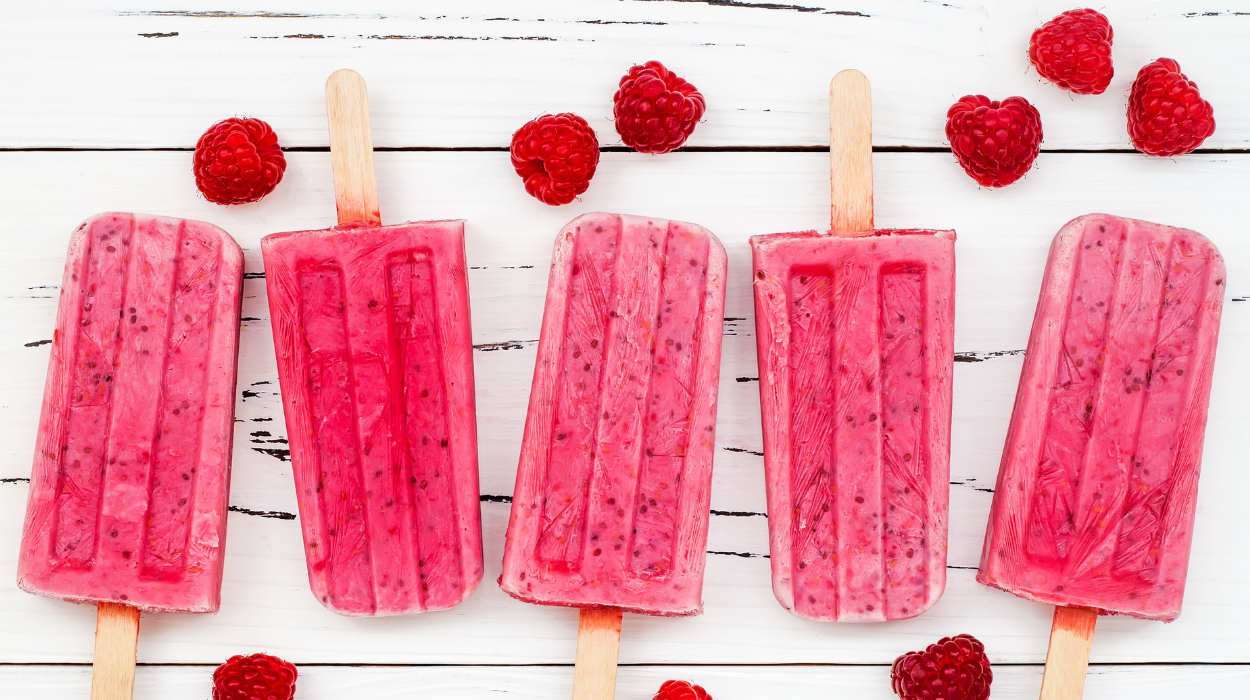
Blend fresh or frozen raspberries with coconut milk and a sweetener. Pour the mixture into popsicle molds and freeze for a refreshing and naturally sweet gluten-free dessert. You can make variations of this vegan version by using different frozen berries in your milk alternative mix. We suggest using monk fruit as the sweetener of choice.
Apple Cinnamon Crisp
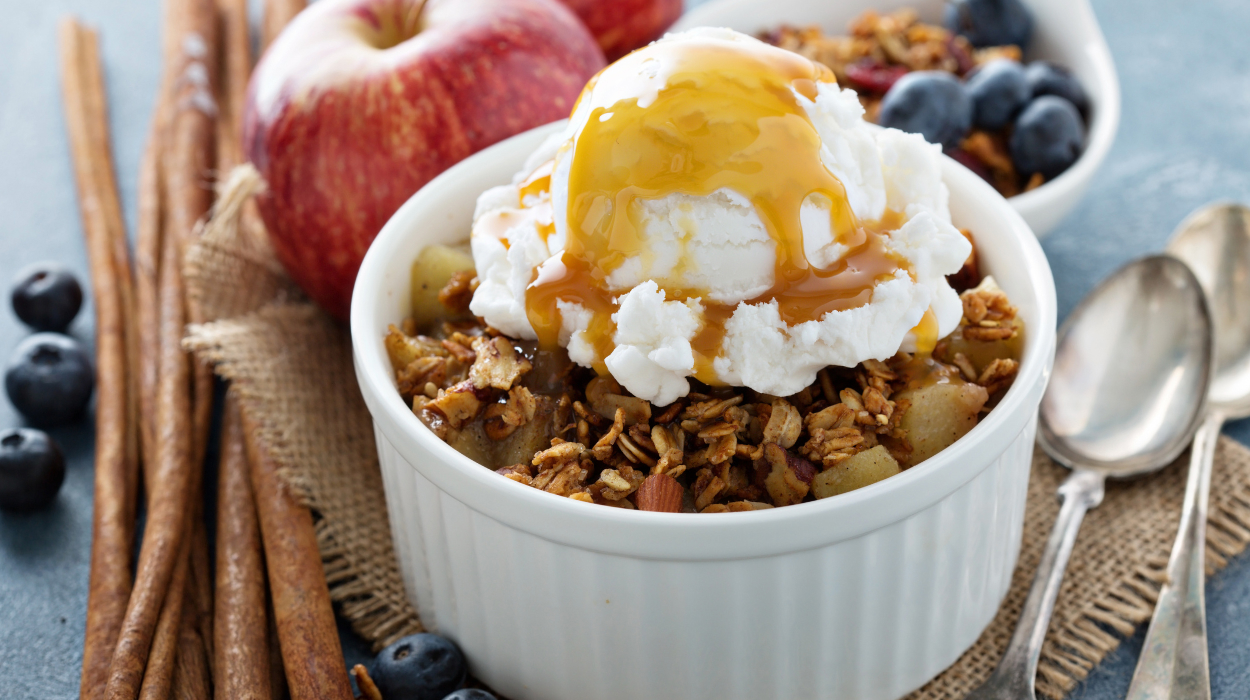
Combine sliced apples with a gluten-free oat and almond flour topping, sweetened with maple syrup or coconut sugar. Bake until golden and crispy for a comforting and wholesome dessert. Top with homemade vegan whipped cream or coconut cream for a naturally vegan dessert.
Pumpkin Energy Balls
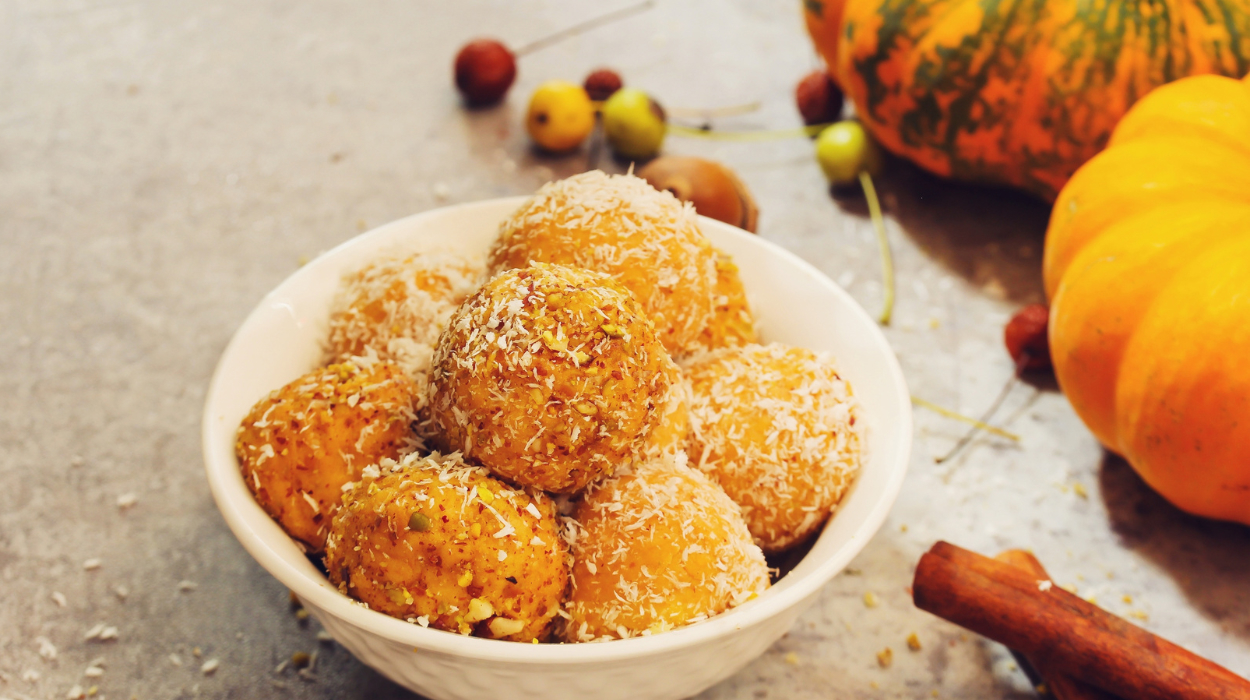
Mix pureed pumpkin, almond flour, dates, and warm spices like cinnamon and nutmeg. Roll the mixture into bite-sized balls, lay them out on a baking tray, and refrigerate for 1-2 hours. When cold and hard, serve them for a nutritious and energy-boosting gluten-free no-bake treat.
Quinoa Chocolate Chip Cookies
Replace traditional flour with cooked and cooled quinoa to make soft, chewy, gluten-free cookies. Add dark chocolate chips, nuts, or dried fruits for extra texture and flavor. Preheat your oven to 350 degrees F. Then pop your cookies in for about 15-18 minutes. Wait till they’re crispy brown, and serve.
Coconut Mango Ice Cream
Blend frozen mango chunks with coconut milk and a splash of lime juice to create a refreshing, creamy, dairy-free ice cream alternative. You can serve it in bowls or cones immediately after you blend or put them in the freezer for a tropical gluten-free dessert.
Mixed Berry Chia Pudding
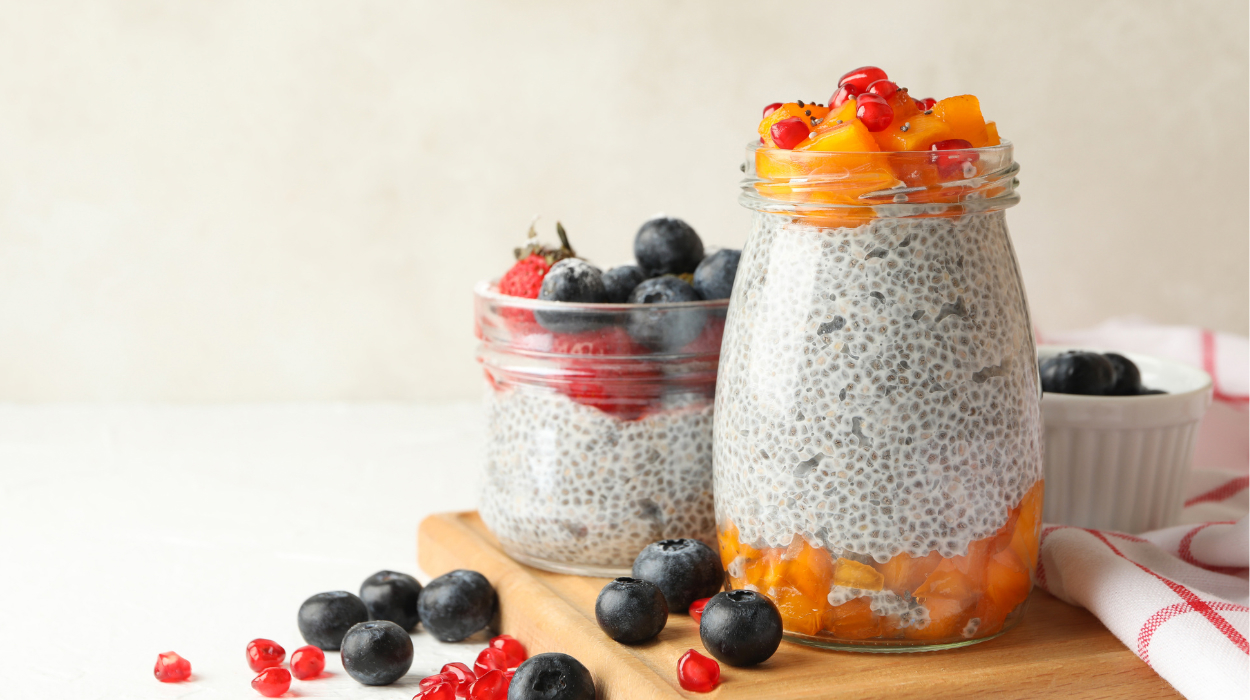
Combine chia seeds, plant-based milk, and a touch of sweetener, such as monk fruit. Let it sit overnight, then top it with a medley of fresh mixed berries for a nutritious and satisfying gluten-free dessert. This is another effortless classic dessert that will satisfy your sweet tooth.
What Are Vegan Gluten Free Desserts Made Of?
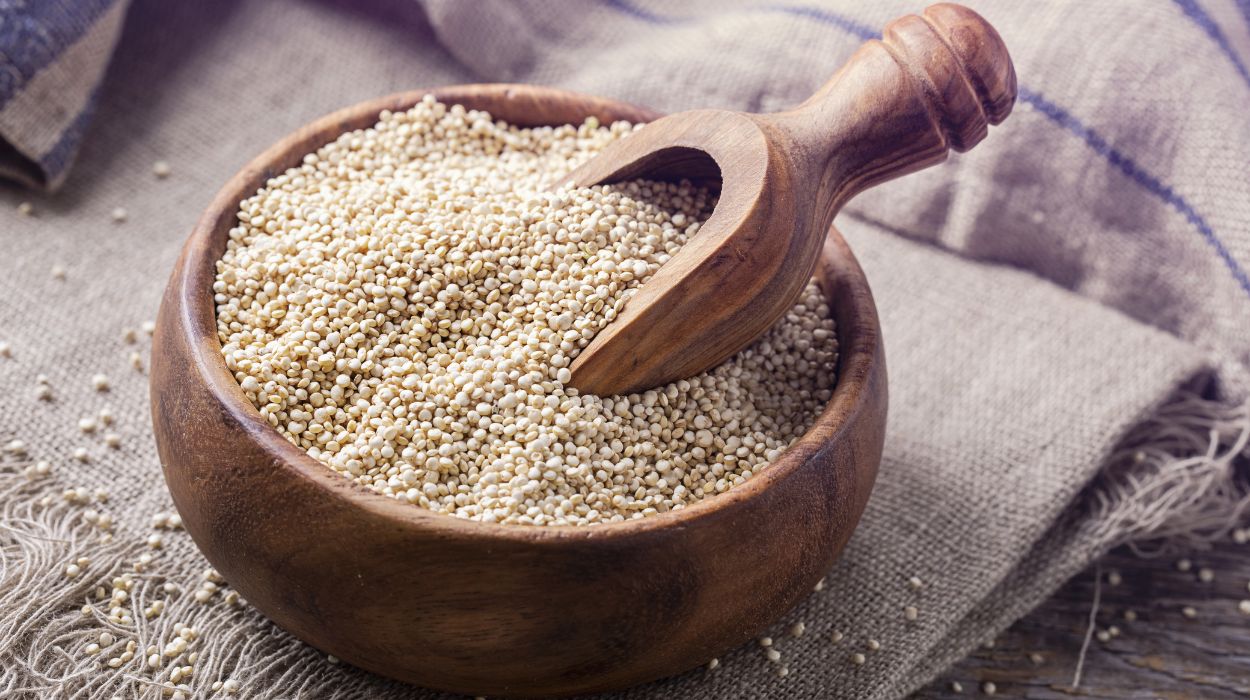
Vegan, gluten-free desserts typically include ingredients from three categories:
Plant-based Ingredients
Gluten free recipes that rely on various plant-based ingredients to give them their flavors and textures. These components include:
- Nut flours: Flour made from nuts and seeds, such as almond, coconut, gluten-free all-purpose, and hazelnut flours, are frequently used as gluten-free substitutes for regular wheat flour. These alternatives give pastries like cookies and vegan gluten free cake a rich, nutty flavor.
- Gluten-free grains: Some gluten-free grains that can be substituted in baking include quinoa flour, brown rice flour, and oat flour. They give desserts shape and texture while simultaneously being gentle on the digestive system.
- Natural sweeteners: Vegans frequently shun refined sugar and sweets in favor of agave nectar, maple syrup, monk fruit, and coconut sugar. Fresh or frozen berries can also be added for additional sweetness.
- Plant-based milk: gluten-free, vegan recipes use plant-based milk such as oats, almonds, and coconut milk instead of dairy milk.
Egg Replacements
Traditional desserts use eggs as leavening agents and binders, but vegan dessert recipes substitute other ingredients, like egg-free. In vegan, gluten-free baking, common egg alternatives[2] include
- Chia or flaxseed: When combined with water, these can make a gel-like substance with the same binding qualities as eggs.
- Unsweetened applesauce: This can substitute for eggs in some recipes, supplying moisture and serving as a binding agent.
- Silken tofu: When blended, silken tofu can replace eggs and give custards, mousses, and other desserts a creamy texture.
Creative Embellishments
Ingenious items are frequently used in gluten free, vegan dessert recipes to improve flavor and texture, some of which are:
- Avocado: A versatile ingredient, avocado lends creaminess and good fats[3] to gluten free, vegan dessert recipes like cheesecake, vegan chocolate cake or chocolate mousse.
- Aquafaba: The liquid from canned chickpeas known as aquafaba may be whisked like egg whites and used in recipes like meringues and macarons that call for a frothy texture.
Health Benefits Of Vegan And Gluten Free Desserts
Vegan and gluten free desserts offer numerous health benefits[4] beyond their delicious taste. These desserts can provide a healthier alternative to conventional treats.
Indulging in these desserts can be a guilt-free way to enjoy the sweeter side of life while supporting your overall well-being. Here are some of their benefits:
Nutrient-Dense Ingredients
Some of the most commonly found nutrients in vegan diets are:
- Vitamin C: Vegan desserts often feature fruits, such as citrus and berries, loaded with vitamin C. This powerful antioxidant boosts immune function and helps collagen synthesis, supporting overall skin health.
- Vitamin E: Nuts, seeds, and their oils, often in vegan, gluten free desserts, contain vitamin E, an antioxidant that supports the immune system and skin health.
- Vitamin B: Vegan desserts can contribute to B vitamin intake through nuts, seeds, whole grains, and nutritional yeast. These desserts may contain vitamins[5] such as B1 (thiamine), B2 (riboflavin), B3 (niacin), and B6 (pyridoxine), which play vital roles in energy metabolism, nervous system function, and red blood cell production.
- Magnesium and zinc: Nuts, seeds, dark chocolate, and whole grains used in vegan and gluten free desserts are excellent sources of magnesium. Magnesium is involved in over 300 enzymatic reactions in the body,[6] supporting nerve function, muscle relaxation, bone health, and cardiovascular health. Zinc, an essential mineral for immune function, wound healing, and cell growth, can also be found in nuts or gluten-free supplements.
Increased Fiber Intake
Vegan and gluten-free desserts often incorporate naturally high-fiber ingredients, such as fruits, vegetables, whole grains, and nuts. A higher fiber intake can promote digestive health,[7] regulate blood sugar levels, and reduce the risk of chronic diseases like heart disease and type 2 diabetes.
Lower Cholesterol Levels
Many vegan desserts avoid using dairy products, which are a significant source of cholesterol. Vegan desserts can help lower cholesterol levels[8] and improve heart health by using plant-based alternatives, such as nut milk and vegan butter.
Potential For Allergy Relief
Food allergies and intolerances can cause discomfort and adverse reactions. Individuals with these sensitivities can enjoy desserts without triggering allergic symptoms[9] by choosing vegan and gluten free desserts, which eliminate common allergens like dairy, eggs, and gluten.
Reduced Intake Of Processed Foods
Vegan and gluten free desserts typically avoid processed ingredients, artificial additives, and preservatives commonly found in conventional desserts. By reducing the consumption of processed foods, you can convert a regular decadent dessert into a delicious recipe that fits dietary restrictions.
Variety And Culinary Exploration
Making a gluten-free and vegan dessert promotes experimentation with new ingredients and flavors when cooking. They present an opportunity to broaden your palate, include personalized vitamins, experiment with novel combinations, and find new favorite dessert recipes that suit your dietary requirements.
Reduced Environmental Impact
Choosing desserts like gluten-free, vegan cupcakes aligns with a more sustainable and environmentally friendly lifestyle.[10] Animal agriculture and the production of dairy products can significantly impact greenhouse gas emissions, deforestation, and water usage.
By opting for plant-based desserts, you contribute to a reduced environmental footprint.
Ingredients To Avoid For Vegan And Gluten-Intolerant
- Wheat and gluten-containing grains.
- Animal-derived products, including all meats, seafood, dairy, and honey.
- Sauces, such as soy, barbeque, and teriyaki. Avoid dressings.
- Seitan, which is used in meat substitutes.
Final Thoughts
Vegan, gluten-free desserts have disproved the myth that dietary constraints mean giving up flavor and enjoyment. These desserts offer a variety of tastes, textures, and enjoyment thanks to their use of plant-based ingredients, ingenious egg alternatives, and creative embellishments.
Whether following a vegan, gluten-free lifestyle or exploring healthier dessert options, these delightful treats can meet your needs. Embrace the abundance of plant-based ingredients and experience the joy of guilt-free indulgence with vegan, gluten-free desserts.
Frequently Asked Questions
Yes, it can meet nutritional needs, but nutrient deficiencies are common. If you feel your diet is inadequate, you can always supplement with multivitamins for vegan diets.
Yes, options include rice, quinoa, amaranth, buckwheat, and gluten-free oat products.
It can be challenging, but many restaurants offer vegan and gluten-free menu items or can accommodate special dietary needs upon request.
A vegan, gluten-free diet can support weight management and overall health. You can always add a vegan fat burner to speed things up.
+ 10 sources
Health Canal avoids using tertiary references. We have strict sourcing guidelines and rely on peer-reviewed studies, academic researches from medical associations and institutions. To ensure the accuracy of articles in Health Canal, you can read more about the editorial process here
- Statista. (2022). Topic: Gluten-free foods market in the U.S. [online] Available at: https://www.statista.com/topics/2067/gluten-free-foods-market/#topicOverview
- Fatma Boukid and Gagaoua, M. (2022). Vegan Egg: A Future-Proof Food Ingredient? [online] 11(2), pp.161–161. doi:https://doi.org/10.3390/foods11020161.
- Dreher, M.L. and Davenport, A.J. (2013). Hass Avocado Composition and Potential Health Effects. [online] 53(7), pp.738–750. doi:https://doi.org/10.1080/10408398.2011.556759.
- Craig, W.J. (2009). Health effects of vegan diets. [online] 89(5), pp.1627S1633S. doi:https://doi.org/10.3945/ajcn.2009.26736n.
- Craig, W.J., Ann Reed Mangels, Ujué Fresán, Marsh, K., Miles, F.L., Saunders, A.V., Haddad, E., Heskey, C., Johnston, P.V., Enette Larson-Meyer and Orlich, M.J. (2021). The Safe and Effective Use of Plant-Based Diets with Guidelines for Health Professionals. [online] 13(11), pp.4144–4144. doi:https://doi.org/10.3390/nu13114144.
- Willi Jahnen-Dechent and Ketteler, M. (2012). Magnesium basics. [online] 5(Suppl 1), pp.i3–i14. doi:https://doi.org/10.1093/ndtplus/sfr163.
- Caio, G., Lungaro, L., Segata, N., Guarino, M., Zoli, G., Volta, U. and De Giorgio, R. (2020). Effect of Gluten-Free Diet on Gut Microbiota Composition in Patients with Celiac Disease and Non-Celiac Gluten/Wheat Sensitivity. Nutrients, 12(6), p.1832. doi:https://doi.org/10.3390/nu12061832.
- Michail Koutentakis, Surma, S., Sylwester Rogula, Filipiak, K.J. and Aleksandra Gąsecka (2023). The Effect of a Vegan Diet on the Cardiovascular System. [online] 10(3), pp.94–94. doi:https://doi.org/10.3390/jcdd10030094.
- Reese, I., Schäfer, C., Ballmer-Weber, B., Beyer, K., Dölle-Bierke, S., Suzanne van Dullemen, Jappe, U., Müller, S., Schnadt, S., Treudler, R. and Worm, M. (2023). Vegan diets from an allergy point of view – Position paper of the DGAKI working group on food allergy. [online] 7(1), pp.57–83. doi:https://doi.org/10.5414/alx02400e.
- Joyce, A., Dixon, S., Comfort, J. and Hallett, J. (2012). Reducing the Environmental Impact of Dietary Choice: Perspectives from a Behavioural and Social Change Approach. [online] 2012, pp.1–7. doi:https://doi.org/10.1155/2012/978672.



